

|
|
Those Who Died That Others Might Be Free
In
1939, Harry O’Neill appeared in just one game for the
Under coach Hen Bream, O'Neill's solid play and
sure-footed kicking helped the Gettysburg Bullets to the Eastern
Pennsylvania Intercollegiate football championship in 1938. "Harry
O'Neill ... gave the old grads high blood pressure when he calmly
booted a 39-yard field goal on the last play before halftime," wrote
a local newspaper about He also led the basketball team to championships
in 1937 and 1938. "Harry O'Neill proved to be the spearhead of the
The following year Harry O'Neill was in military
service with the United States Marine Corps. In January 1944, with
the Fourth Marine Division, he was promoted to first lieutenant at O'Neill and the Fourth Marine Division made
major amphibious assaults at Kwajalein, Saipan and The island was riddled with pillboxes, gun-pits,
trenches and mortar sites and a three-day naval bombardment
beginning on February 16 was intended to rid the island of much of
its defense. But despite its enormity the bombardment had minimal
effect and US forces met fanatical resistance when they hit the
beaches on February 19. "We
are trying to keep our courage up, as Harry would want us to do,"
wrote his sister, Suzanna, in a letter to 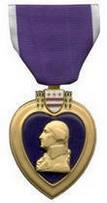
Date and Place of Birth: May 8, 1917 Philadelphia,
Pennsylvania
Date and Place of Death: March 6, 1945 Iwo Jima
Baseball Experience: Major League
Position: Catcher
Rank: First Lieutenant
Military Unit: 25th Marines, Fourth Marine Division USMC
Area Served: Pacific Theater of Operations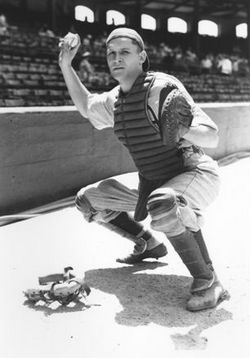 Harry M O'Neill was born in
Harry M O'Neill was born in 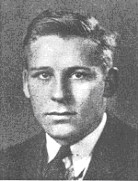 In baseball, he helped coach
Ira Plank (brother
of former major leaguer Eddie Plank) capture the 1938 Eastern
Pennsylvania Intercollegiate baseball title. "Porky O'Neill reached
the status of a hero here today," claimed a local
paper on May 4,
1938, "when his single in the ninth inning drove one run home and
enabled the Gettysburg Bullets to nose out a stubborn Nittany Lion
in nine grueling innings 5-4."
In baseball, he helped coach
Ira Plank (brother
of former major leaguer Eddie Plank) capture the 1938 Eastern
Pennsylvania Intercollegiate baseball title. "Porky O'Neill reached
the status of a hero here today," claimed a local
paper on May 4,
1938, "when his single in the ninth inning drove one run home and
enabled the Gettysburg Bullets to nose out a stubborn Nittany Lion
in nine grueling innings 5-4."
The 6-foot-3, 205-pound youngster was a much sought after athlete
and rumors that he would sign with the Washington Senators were
common-place in early 1939. Instead, O'Neill signed with Connie
Mack’s Philadelphia Athletics immediately after his graduation on
June 5, 1939 for $200 a month.
He spent the rest of the year with
In 1940, O'Neill was assigned to the Allentown Wings of the
Interstate League, and then in July he joined the Harrisburg
Senators of the same
league, playing 16 games and batting .238. He also worked as
history teacher and three-sport coach at
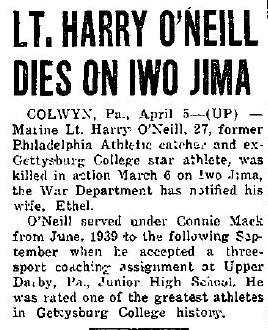
Chester (PA) Times, April 7, 1945
Iwo Jima, 750 miles south of
On March 6, 1945 – as American troops moved inland - First
Lieutenant Harry O'Neill was killed. It was a month before his wife,
Ethel McKay O'Neill, received news of his death from the Navy
Department.
In 1980, Harry O'Neill was inducted in the Hall of Athletic Honor at
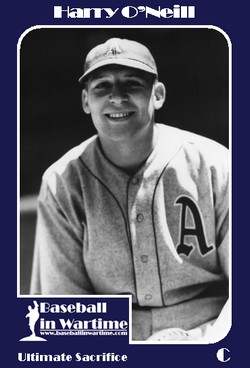
Added July 14, 2006. Updated November 4, 2008.
Copyright © 2011 Gary Bedingfield (Baseball in Wartime). All Rights Reserved.